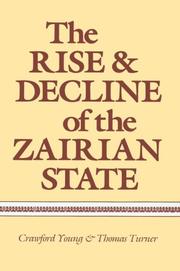| Listing 1 - 3 of 3 |
Sort by
|

ISBN: 0299101134 1283991020 9780299101138 029910110X 9780299101107 0299101142 9780299101145 9781283991025 Year: 1985 Publisher: Madison, Wis.
Abstract | Keywords | Export | Availability | Bookmark
 Loading...
Loading...Choose an application
- Reference Manager
- EndNote
- RefWorks (Direct export to RefWorks)
Zaire, apparently strong and stable under President Mobutu in the early 1970s, was bankrupt and discredited by the end of that decade, beset by hyperinflation and mass corruption, the populace forced into abject poverty. Why and how, in a new state strategically located in Central Africa and rich in mineral resources, did this happen? How did the Zairian state become a "parasitic predator" upon its own people? The authors examine the political history of Mobutu's Zaire, looking at critical structures and patterns of societal flux, inequality, and cleavage, in particular the urban-rural nexus, the problematic of class formation, and the fluid patterns of cultural pluralism.
Mobutu Sese Seko, --- Mobutu, Joseph-Désiré, --- Seko, Mobutu Sese, --- Sese Seko, Mobutu, --- Mobutu, Sese Seko, --- Mobutu Sese Seko Koko Ngbendu wa za Banga, --- Congo (Democratic Republic) --- Politics and government --- Mobutu, Sese Seko --- Mobutu Sese Seko Kuku Ngbendu Wa Za Banga --- Mobutu, Joseph Désiré
Book
ISBN: 168123288X 9781681232881 9781681232867 1681232863 9781681232874 1681232871 Year: 2016 Publisher: Charlotte, NC
Abstract | Keywords | Export | Availability | Bookmark
 Loading...
Loading...Choose an application
- Reference Manager
- EndNote
- RefWorks (Direct export to RefWorks)
Social sciences --- Study and teaching (Elementary) --- Curricula. --- Study and teaching (Secondary) --- Study and teaching --- Methodology.
Book

ISBN: 9811366136 9811366128 Year: 2019 Publisher: Singapore : Springer Singapore : Imprint: Springer,
Abstract | Keywords | Export | Availability | Bookmark
 Loading...
Loading...Choose an application
- Reference Manager
- EndNote
- RefWorks (Direct export to RefWorks)
This book focuses on zero hours and on-call work as an extreme form of casual and precarious employment. It includes country studies of the USA, Canada, Australia, the UK, New Zealand and Ireland, where there has been increasing concern about the prevalence of such work, and working time uncertainty, as well as varying levels of public policy debate on regulation. The book incorporates a comparative review of zero hours work based on the findings of the country studies. This pays particular attention to state regulatory responses to zero hours work, and incorporates the sociological concepts of accumulation and legitimation functions of the state. Exploring the regulation of zero hours work beyond individual countries, the book includes an analysis of external regulation of zero hours work at the supranational level, namely the European Union and ILO. Further, it assesses the implications of zero hours for workers in new sectors of economic activity, particularly the impact of the platform or ‘gig’ economy on the fundamental nature of the employment relationship. It also considers the societal implications of zero hours work and the ethical responsibilities of employers and governments towards workers as citizens. .
Personnel management. --- Labor economics. --- Industrial sociology. --- Industrial organization. --- Human Resource Management. --- Organizational Studies, Economic Sociology. --- Labor Economics. --- Sociology of Work. --- Industrial Organization. --- Industries --- Organization --- Industrial concentration --- Industrial management --- Industrial sociology --- Sociology --- Industrial organization --- Economics --- Corporations --- Employment management --- Human resource management --- Human resources management --- Manpower utilization --- Personnel administration --- Management --- Public administration --- Employees --- Employment practices liability insurance --- Supervision of employees --- Social aspects --- Personnel management --- Economic sociology. --- Economic sociology --- Socio-economics --- Socioeconomics --- Sociology of economics
| Listing 1 - 3 of 3 |
Sort by
|

 Search
Search Feedback
Feedback About UniCat
About UniCat  Help
Help News
News